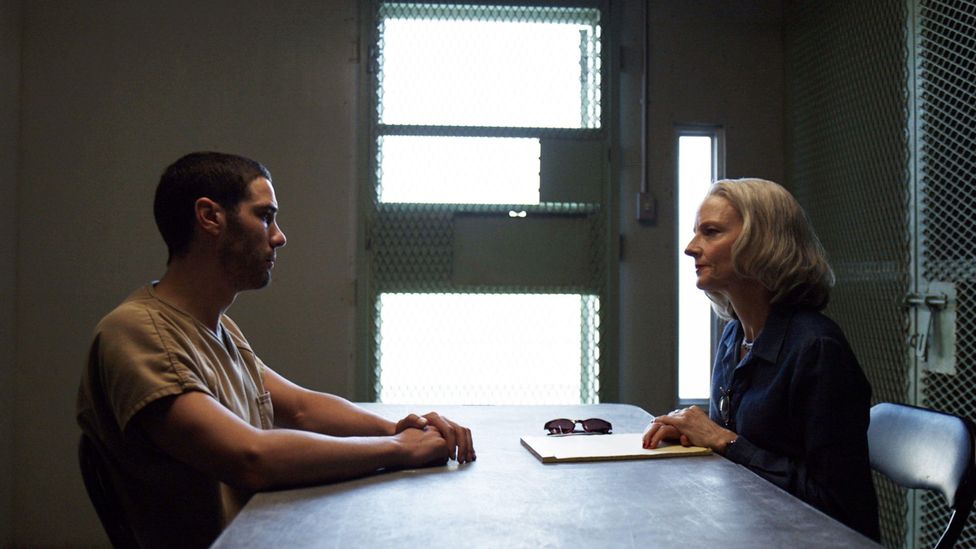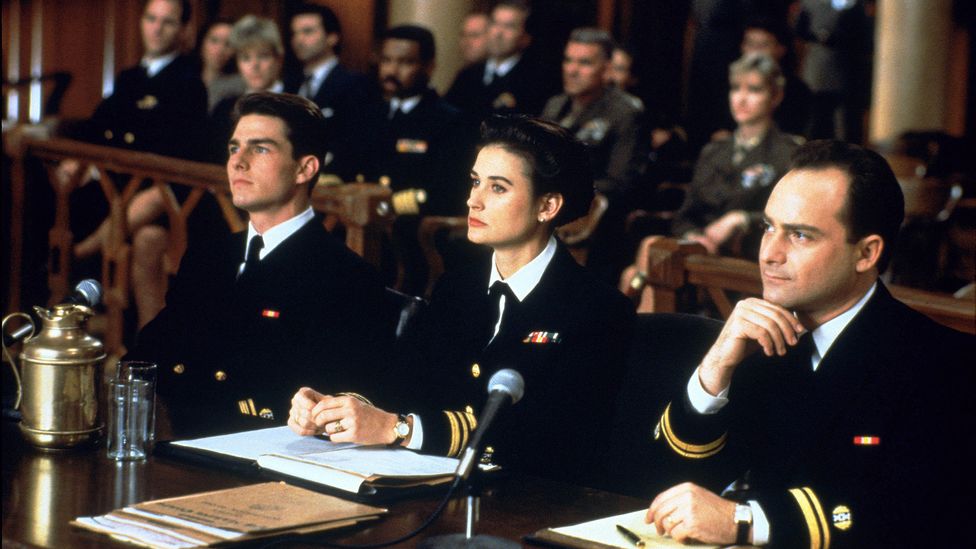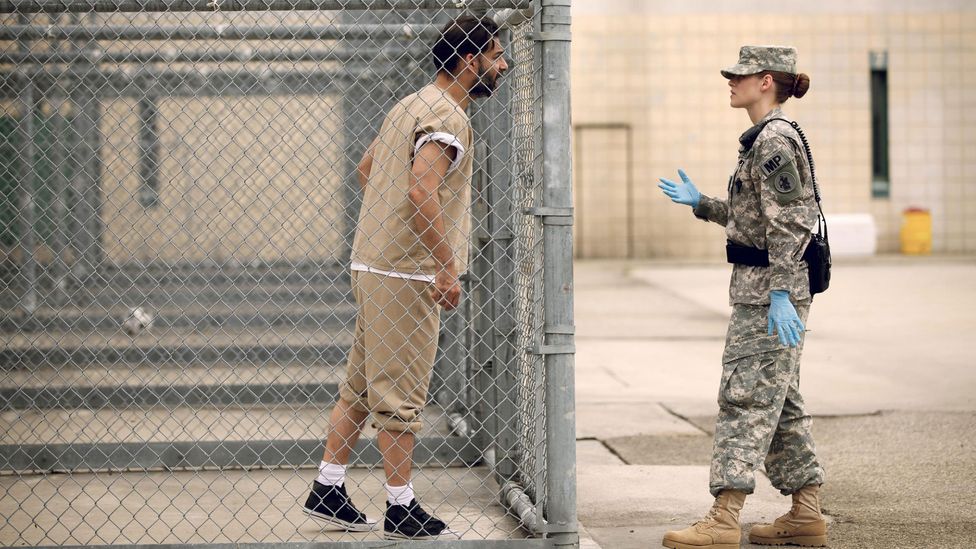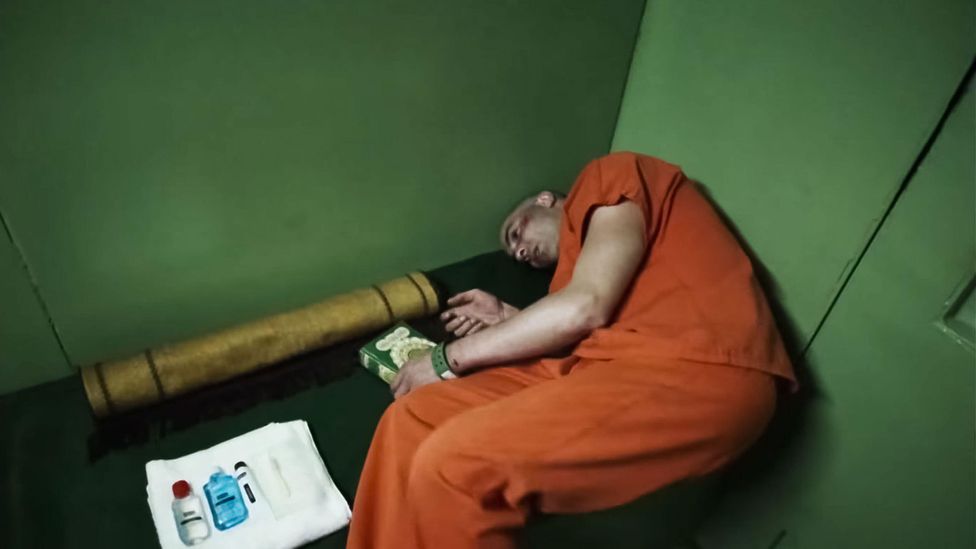When Tahar Rahim was approached to star in The Mauritanian, Kevin Macdonald's biopic about the 14-year imprisonment without charge of Guantánamo Bay detainee Mohamedou Ould Slahi, he knew as much about the US prison camp as the average Western audience the film was being made for. Rahim had heard the news stories about the US Naval Base in Cuba where guards were reportedly mistreating prisoners but honestly, he couldn’t imagine that "a country like America would let soldiers treat human beings in such a way." But after signing on to the film, based on Slahi's memoir, Guantánamo Diary, the French-Algerian actor did his research and everything changed.
More like this:
– Ten films to watch in February
– The history of racism in war movies
– The real 'heart of darkness'
"I read the script, I read the book, I watched documentaries and I talked with Mohamedou so I was happy to get this part," Rahim tells BBC Culture. "But I was sad and angry because I knew that this was a true story."

The Mauritanian tells the story of detainee Mohamedou Ould Slahi (Tahar Rahim), and his fight for freedom aided by attorney Nancy Hollander (Jodie Foster) (Credit: Alamy)
Before 9/11, the most high-profile screen representation of Guantánamo Bay was in the 1992 movie A Few Good Men. Adapted by Aaron Sorkin from his own stage play of the same name, the legal drama pits Tom Cruise, Demi Moore and Kevin Bacon against each other as military lawyers trying a case concerning the court-martial of two US Marines charged with the murder of a fellow Marine at the naval base. It famously features the climactic courtroom cross-examination of Jack Nicholson's base commander Colonel Jessup by Cruise’s Lieutenant Kaffee. Kafee wants Jessup to admit he influenced the murder of the Marine Santiago and orchestrated the subsequent cover-up. "I want the truth!" he bellows, to which Jessup retorts, "You can’t handle the truth!" and launches into a speech about the necessary evils the military is relied upon to carry out in order to protect their nation.
"Son, we live in a world that has walls, and those walls have to be guarded by men with guns. Who's gonna do it? You?" Jessup spits from the witness stand. "I have neither the time nor the inclination to explain myself to a man who rises and sleeps under the blanket of the very freedom that I provide, and then questions the manner in which I provide it! I would rather you just said 'thank you' and went on your way."
As it turned out, it was somewhat prescient that Guantánamo Bay served as the context for Jessup to deliver this final act pontification. For ever since President George W Bush established the base as a detention centre in 2002, to house accused Islamic terrorists believed to have been involved in the 11 September attacks on the US, the site nicknamed 'Gitmo' has been at the centre of a fierce debate about the powers of the US military and the belief that the ends justify the means.
Sorting the evidence on screen
It's a discussion that has long carried through into film and TV also. In 2005 US cable channel PBS aired one of the first documentaries to look behind the scenes of Guantánamo Bay, The Torture Question, which was part of its Frontline strand. It examined the Bush administration's efforts to create a legal framework for the enhanced interrogation techniques used on detainees at Guantánamo Bay, as well as US bases in Afghanistan and Iraq's Abu Ghraib prison. Similarly, Gitmo – The New Rules of War (2006), Taxi to the Dark Side (2007), Explorer: Inside Guantánamo (2009) and The Guantánamo Trap (2011) all offer testimonials from former detainees, military officials, whistleblowers, lawyers and others to paint a picture of how the controversial methods came into play against the 780 men, primarily of Middle Eastern, South Asian and North African descent, who have been imprisoned by the US government over the last 18 years there.
Documentaries have certainly outnumbered narrative features on the subject but British director Michael Winterbottom married both types of storytelling for his 2006 docudrama The Road to Guantánamo. The filmmaker provided a platform for the so-called 'Tipton Three' to recount the events that led to their 2001 capture in Afghanistan, and subsequent incarceration for two years at the base, while employing actors, including Riz Ahmed in his first film role, to dramatise their ordeal. Winterbottom's film is a rarity in that it offers the perspectives of Ruhal Ahmed, Asif Iqbal and Shafiq Rasul only, rather than those of either their captors or their legal saviours. However two of the other key feature films about Guantánamo, Camp X-Ray (2014) and The Report (2019), both focus far more on the white US perspective.
The former indie film offers up a fictional story focused on a female soldier stationed at the base, played by Kristen Stewart, who slowly becomes disillusioned with her command after witnessing the inhumane treatment of detainees and befriending one in particular: Ali Amir (Peyman Moaadi) a German-born, Muslim man who is kidnapped from his home in Bremen at the beginning of the film. Ali is positioned as a sort of 'noble savage'; his love of Harry Potter and progressive nature towards women sets him apart from his uncivilised, captive brethren, who are frothing with misogynistic rage and intolerance in comparison.

1990s courtroom drama A Few Good Men centred on a murder at the Guantánamo Bay naval base (Credit: Alamy)
But while Camp X-Ray perpetuates negative stereotypes about Muslim detainees, The Report dehumanises them entirely. Scott Z Burns' legal drama is based on the true story of Dan Jones, played by Adam Driver, the lead investigator on the Senate Intelligence Committee's torture report, which documented the CIA's rendition, detention, and interrogation program from 2002 to 2008. Jones is portrayed as the 'white knight' exposing the American public to the truth about torture practices, including waterboarding, that were used against accused al-Qaeda members like Abu Zubaydah (Zuhdi Boueri). Reportedly the first prisoner to undergo enhanced interrogation techniques, following his capture in Pakistan in 2002, Zubaydah continues to be detained without trial by the US authorities.
However, Burns' depiction of the experiences of the Saudi-born Palestinian, whose birth name is Zayn al-Abidin Muhammad Husayn, is harrowing but superficial. Zubaydah is simultaneously portrayed as a one-dimensional villain and a nondescript punching bag for the CIA. This causes an empathy gap to develop between him and the viewer, who cannot possibly identify with the visceral trauma the camera is forcing them to watch.
Daphne Eviatar, Amnesty International USA's Security with Human Rights Director, says too often these narrative features fail to portray the detainees as human beings. "It's difficult to provide enough context and understanding of their daily lives when that's only the background portion of a one-two hour film, Eviatar tells BBC Culture. "Forty men are still detained indefinitely there and most Americans have no sense of who these men are [and] no understanding of the places and cultures they came from or how they could have been seized and handed over to [US] authorities for corrupt or political purposes.
"In addition to placing these men beyond the reach of US law, imprisoning them at Guantánamo placed them beyond the reach of the US imagination."
The 'white saviour' problem
With their sympathetic portrayals of US soldiers and lawmakers trying to help the detainees, both of the aforementioned dramas can also be viewed as part of the much-criticised tradition of so-called 'white saviour' films, which focus on white protagonists who come to the aid of people of colour, and centre on the former at the expense of the latter.
The Mauritanian also conforms to this stock narrative, though only up to a point. Focusing on Slahi's harrowing journey from his homeland of Mauritania, where he was arrested two months after 9/11 and accused of working for al-Qaeda, to Guantánamo Bay, it also makes substantial room for the US legal forces working for and against him in the name of justice: Jodie Foster as defence attorney Nancy Hollander, fighting for her client's freedom, and Benedict Cumberbatch as military prosecutor Lt Colonel Stuart Couch, fighting for the death penalty against Slahi until new evidence comes to light. However while they provide white star power, they wanted to limit their screen time, according to production designer Michael Carlin. "Usually actors try and make their parts bigger but in this case, it was almost the opposite effect," Carlin tells BBC Culture. "They didn't want to do anything that would take away from Mohamedou's story because that's why they made the film. They didn't make it for money."

2014 indie film Camp X Ray told the fictional story of a soldier (Kristen Stewart) bonding with a prisoner (Peyman Moaadi) (Credit: Alamy)
Slahi was accused of terrorism because he had once supported al-Qaeda during the 1980s Afghanistan insurrection but after several years of physical and psychological torture at the prison camp, Hollander helped him to win a ruling of unlawful detention by the US government. He was never charged with a crime but was locked away for a further six years before his 2016 release, and neither Foster nor Cumberbatch wanted to steal focus from his ordeal.
Slahi trusted Macdonald not just because of his background in making factual documentaries like Touching the Void (2003) and Marley (2012) but because of his experience in Africa making the Oscar-nominated biopic The Last King of Scotland (2006) starring Forest Whitaker as Ugandan President Idi Amin. "That movie was so convincing," the author says.
The film relied as much on Slahi himself to bring a visual authenticity to his story as it did on his memoir to inform the script. The former detainee was able to provide detailed descriptions to Macdonald and Carlin about his Guantánamo isolation, using his body to give exact measurements of the tiny cages and cells he was held in so that they could replicate the camp in composite sets built by army engineers in Cape Town, South Africa. In recreating Guantánamo, the production relied on agency photos of the site, images soldiers had posted online and supposed military documents and manuals sourced by military advisors but Slahi was able to separate the wheat from the chaff.
"Some of the military advisors that we use in the film industry are more like military fetishists so their information needs to be taken with a pinch of salt but Mohamedou was able to help me catalogue it [all] so we knew which photos were real, which were not, and which were appropriate to his story," Carlin says. "The whole thing is about deprivation and that is what we were trying to get at."
A humane depiction
What the film's creative team didn’t want to do is fall into the trap of framing Slahi as anything less than a human being. The Mauritanian does portray some of the harsh treatment he experienced but as soon as torture enters the narrative, the audience is transported into Slahi's memories of his life before his detention. "As soon as you torture a character they become unsympathetic, which is bizarre," Carlin says. "But we didn't want to make torture porn so Kevin and the writers take him out of that space when those horrible things were happening and into his past which enables you to keep seeing him as a human being."
Rahim spent time with Slahi to both understand his experiences, and get a hold on his personality and mannerisms, but felt "stupid" about some of the questions he asked. "I talked about what happened over there and saw the PTSD on his face and I felt bad," the actor recalls. "I was like, I don't want to do this, he has been suffering for too long so I stopped and started to talk about [other] things so I can know him for his personality, the way he moves, the way he talks, the way he answers questions, the way he cracks jokes. It helped me to infuse him in me."

For The Mauritanian, Slahi was able to provide detailed measurements of the tiny cages and cells he was held in so that producers could recreate them (Credit: Alamy)
Rahim, known for his critically-acclaimed role in 2009 French prison drama A Prophet and 2018’s 9/11 miniseries The Looming Tower (where he played real-life FBI agent Ali Soufan who also appeared in The Report), has done his best to avoid being cast as one of the many Muslim terrorist characters created for film and TV over the last 20 years. But reading the script for The Mauritanian, he found it to be one of the few that had a "sympathetic Muslim character at the heart of an American movie," and felt empowered to come on board the project as a result. "I needed to know that [Slahi] is innocent because if he was a terrorist I don’t think I would have done this movie," Rahim says. "I'm not saying that there are no terrorists. A small fraction of these people are taking the whole attention and we don’t even see the others and these people are suffering as much."
"Mohamedou won his case, he’s innocent and these movies are testimonies for the next generation," the actor adds. "I don't care if the director is white or black or Asian. These movies need to be told [and] these histories shown to audiences or we are doomed to repeat it."
Slahi does not want to relive the worst moments of his captivity and so has avoided watching the most traumatic scenes in the film. But, now his book has been turned into a major feature film, he believes it is a clear example of the pen being mightier than the sword. "I don’t believe in violence but my whole story was violence against my body, my innocence, members of my family and I never did anything to the US," he says. "My movie is a victory for non-violence, it's a victory of the pen."
The fact is, however, that while many feature films, documentaries, TV shows, books and news reports have shown the reality of the prison camp, it still remains open. The Obama administration promised to close it and failed. Now President Biden has said he aims to close it before his first term finishes. So with a new president in the Oval Office, could The Mauritanian be the Guantánamo Bay movie to herald the end of the detention centre?
Rahim wants audiences to take away the message of "hope and forgiveness over anger," while Eviatar says, "any films that depict the tragedy of Guantánamo, the unjust and often haphazard way many men ended up there and thereby put pressure on the US government to close it down, is doing a great service."
Slahi, who continues to be denied entry into the US and the UK five years after his release from Guantanamo Bay with no compensation or apology, hopes the film will show the Western world that he is an innocent man and that the negative perceptions of Middle Eastern and North African citizens need to end.
"I want people to know my side of the story [and] I feel humbled that it was made into a major motion picture," he says. "I don't have weapons, I don't have the police. I don't have drones to take out people but I have my words and I want to debate the negative exceptionalism [towards] the Arab world and Africa. We can't be kidnapped; we can't be tortured."
The Mauritianian is in select cinemas in the US now, and will be available on demand there from 2 March.
Love film and TV? Join BBC Culture Film and TV Club on Facebook, a community for cinephiles all over the world.
If you would like to comment on this story or anything else you have seen on BBC Culture, head over to our Facebook page or message us on Twitter.
And if you liked this story, sign up for the weekly bbc.com features newsletter, called The Essential List. A handpicked selection of stories from BBC Future, Culture, Worklife and Travel, delivered to your inbox every Friday.
"world" - Google News
February 19, 2021 at 07:05AM
https://ift.tt/3qCBeqP
Exposing life inside the world's most notorious prison - BBC News
"world" - Google News
https://ift.tt/3d80zBJ
https://ift.tt/2WkdbyX
Bagikan Berita Ini














0 Response to "Exposing life inside the world's most notorious prison - BBC News"
Post a Comment